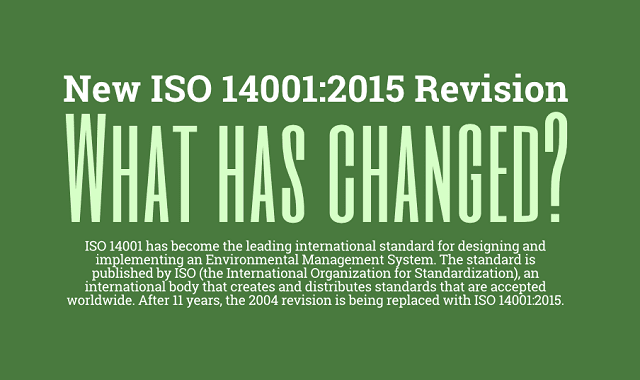One of the world's most popular standards for environmental management has just been revised, with key improvements that make it fit for the future. ISO 14001, the leading international standard for designing and implementing an Environmental Management System, has been through an important revision in 2015, after a previous version that lasted for 11 years.
What is ISO 14001?
ISO 14001 is an international standard that helps organizations manage their environmental responsibilities in a way that protects and sustains the environmental pillar.
What does the new revision bring?
This is ISO 14001’s second revision. Compared with the 2004 version, the new one is aligned with Annex SL, making it more compatible with other management systems standards. ISO 14001:2015 is applicable to any organization, regardless of size and type of business.
The standard applies to the environmental aspects of its activities, products and services that the organization determines it can either control or influence considering a life cycle perspective.
The 2015 revision of ISO 14001 will bring better integration with other business activities, enhancement of the process approach and PDCA cycle, decentralization of the system and spread of responsibilities for the EMS throughout the organization.
It will have a greater involvement of the top management, consideration of the whole lifecycle of the product or service during aspects evaluation and higher emphasis on environmental performance monitoring.
Companies must transit to the new version by September 2018 and can do it starting September 2015. To learn more about how to implement the new revision in a DYI approach, visit: advisera.com
 Infographic by: advisera.com
Infographic by: advisera.com
What is ISO 14001?
ISO 14001 is an international standard that helps organizations manage their environmental responsibilities in a way that protects and sustains the environmental pillar.
What does the new revision bring?
This is ISO 14001’s second revision. Compared with the 2004 version, the new one is aligned with Annex SL, making it more compatible with other management systems standards. ISO 14001:2015 is applicable to any organization, regardless of size and type of business.
The standard applies to the environmental aspects of its activities, products and services that the organization determines it can either control or influence considering a life cycle perspective.
The 2015 revision of ISO 14001 will bring better integration with other business activities, enhancement of the process approach and PDCA cycle, decentralization of the system and spread of responsibilities for the EMS throughout the organization.
It will have a greater involvement of the top management, consideration of the whole lifecycle of the product or service during aspects evaluation and higher emphasis on environmental performance monitoring.
Companies must transit to the new version by September 2018 and can do it starting September 2015. To learn more about how to implement the new revision in a DYI approach, visit: advisera.com
 Infographic by: advisera.com
Infographic by: advisera.com
